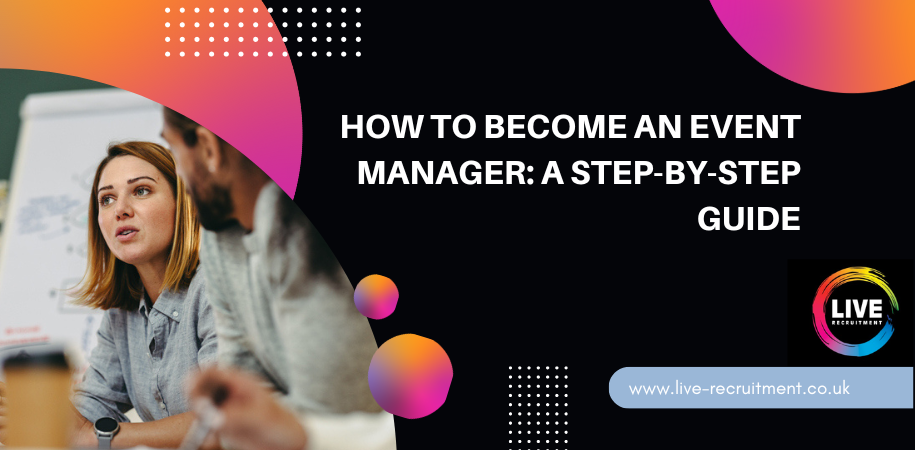Thinking about a career in events? This fast-paced and rewarding career path is well suited to anyone with a keen eye for organisation and an outgoing personality. If you love to think on your feet and want every day to feel like a new and exciting challenge, then retraining for a role as an events manager could be ideal for you.
The barriers to entry for an events manager role are quite low. You don’t have to have specific qualifications and experience will be far more important to prospective employers than the university you attended. It’s also not uncommon for individuals to find this career path later in life, with many people retraining as event managers and using skills learned in other professions to make the jump.
If you’re thinking about moving into a role as an events manager, here is everything you need to know about making the switch.
What is an events manager?
An events manager plans and executes events of all sorts, including private events such as weddings or birthdays, to corporate events like conferences and awards shows. The events manager is responsible for planning the event and being there on the night to make sure things run smoothly. It is an incredibly fast-paced industry and you might be working irregular hours. You’ll likely be given time off in lieu to make up for the anti-social working hours in the run-up to an event.
What does an events manager do?
An events manager will take responsibility for the following essential tasks:
Coming up with the initial idea for an event
Finding the venue and other key vendors
Negotiating with vendors to get the best price
Keeping track of budgets and spending
Reporting to event stakeholders on progress and results
Booking entertainment or speakers
Managing teams of event staff or volunteers
Managing the guest list and artist liaison
Arranging sponsors for the event
Deciding on the decor and style for the event
Coordinating everything during the event
Troubleshooting issues that might arise
Reporting on the success of an event
Documenting the event for social media
If these sound like tasks that you would be happy to undertake, you should consider a role in events management. The rewards can be very impressive. The reason most people head down the route of events management is to be involved in the glitzy world of planning events. You could end up working for fashion shows, trade shows or conferences. If you are very philanthropic, you might be interested to learn more about how you could work for charity events and fundraisers. And if you love nightlife, event management could allow you to work on launches for the hottest clubs and venues.
If you want to move into event management as your career, these are the steps you will need to take.
Research the industry
You need to know exactly what you are getting into before you take the plunge. Research before you change careers is always a good idea so that you don’t chase an imaginary dream career that doesn’t really exist.
You could talk to people already working in the sector to find out more about what it is really like. Obviously, there are downsides to every role, and some people will place the emphasis on the negative over the positive. It’s your job to take all of this information on board so you can make an informed decision about what is right for you.
Identify your skills
Do you really have the right skills to be an events manager? Look at some job descriptions for the role and ask how many of the key requirements you really possess. Some will be industry-specific and you won’t learn them until you gain some experience. But some are essential skills that you either have or you don’t.
For example, most event managers like to be out and about, meeting new people and checking out new venues and vendors. If you prefer the predictability of an office job and would rather be working in the same place every day, an event manager role might not be for you. You might be better suited to an events administrator role, if you are still determined to work in events.
Get some experience
Experience is not only the best way to show prospective employers that you have what it takes, but it’s also a great way to determine if you really want to make the leap. Ask an events management company if they have any intern, work experience or shadowing opportunities. This will give you an excellent understanding of what it takes to be an event manager and if this is the path you want to take.
If you can’t find a shadowing opportunity, you could also volunteer at some events to get a feel for what goes on behind the scenes. Charitable events and festivals are often looking for event volunteers to help with staffing. If you do this, make it clear to the volunteer manager what you are hoping to get out of it, because many volunteers are simply there to do the bare minimum in exchange for free tickets. They will appreciate that you are there to learn as much as possible.
Develop your CV
Look at your existing CV and try to find the best way to present your experience so that it would be relevant to an event manager role. You might already have extensive experience in planning, but you simply need to show hiring managers how this is relevant to an event manager role.
If you’re struggling to adapt your CV and cover letter to an event manager role, we suggest speaking to a specialist recruitment advisor. They will be very familiar with what the hiring managers are looking for in a CV and will be able to provide invaluable advice that helps you to put your best foot forward.
Try some training
There are a wide range of event management courses available, ranging from degree programmes to online learning. A degree will take three years to complete full time and even longer part time, so this might not be an option for someone that has already entered the workforce and is looking for a career change. Instead, you might be able to get away with just a short course in events management to demonstrate your intent.
Speak to employers
Employers don’t have to have job openings available for you to email and introduce yourself. You can always reach out to prospective employers and ask if they are willing to discuss what they look for in a new hire. This can help you to get the insider track on what might be missing from your CV. Failing this, you can also talk to recruiters, who will have access to similar information that will be invaluable to your job hunt.
Be flexible in your hunt
If you are too narrow in your hunt for a new role, you might miss out on key opportunities to get your foot in the door. Don’t limit your search to event manager roles, and instead look at the industry as a whole. You might be able to find your way into an events management company through another avenue such as marketing, accounting or administration.
Look at your existing experience and think about how that might be useful to an events management company. You can then apply this to roles in and around event management to help you find something that is a suitable fit.
Never stop learning
Even after you have landed your first role in events management, you can make yourself more competitive by ensuring that you never stop learning. The sector is always changing and new technology will always be introduced to disrupt the sector. By committing to continual, lifelong education, you can make sure that your lack of a background in events management doesn’t hold you back from getting ahead.
Learning could mean trying out different areas of the business, going on short training courses, or exploring working across different event sectors. This will ensure your CV remains well-rounded and incredibly competitive, so you can make the most of opportunities that arise.
Closing thoughts
Working in events management is incredibly challenging but also incredibly rewarding. You’ll be challenged to push yourself every single day. It’s also incredibly varied, so you can enjoy the buzz of getting out and about and not being stuck behind a desk all day.
If you’re thinking about a change of career, you don’t have to start at the beginning and get a degree. There are often ways you can repurpose your experience to be relevant to a new role. All you need to do is understand the sector you’d like to move into and what hiring managers are looking for in 2023 and beyond. By using this guide, you can take experience from another sector and put it to work in a role as an event manager. Good luck!


